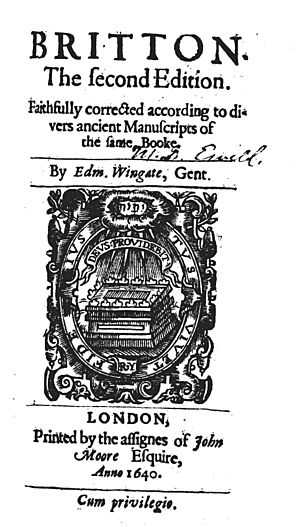Britton (book) facts for kids

The book Britton is a very old and important summary of English law. It was written in a special old French language called Law French. This book claims it was written because King Edward I asked for it. It's one of the earliest books to explain the laws of England in this way.
Contents
Discovering Britton: An Ancient Law Book
Britton is a key historical text about the laws of England. It helps us understand how laws were organized and written down a long time ago. It's special because it was one of the first books to try and summarize all the laws in one place.
What is Law French?
Law French was a language used in England for legal documents and discussions from the 11th to the 17th centuries. It was a mix of Old French and some English words. Lawyers and judges used it to talk about legal matters.
Who Wrote This Book?
No one is completely sure who wrote Britton. It's a bit of a mystery!
- Some people thought John le Breton, a bishop, wrote it. But this bishop died in 1275. The book mentions laws that were made after he died, like the Quia emptores law from 1290. So, he probably wasn't the author.
- Another idea came from John Selden, a famous scholar. He thought the book might be named after Henry de Bracton. Bracton was a very important judge who wrote a huge book about English laws. Selden thought Britton might be a shorter version of Bracton's work, with some newer laws added.
- However, Britton is organized differently from Bracton's book. Also, only a small part of Bracton's work is found in Britton. So, it's not just a simple copy or summary.
One old manuscript from the 1300s calls the book Summa de legibus Anglie que vocatur Bretone. This means "Summary of the laws of England which is called Bretone." A learned man named Andrew Horn also mentioned it in his will in 1329. He called it "a book called Bretoun" and gave it to the Guildhall in London.
For a long time, Britton only existed as handwritten copies. Then, it was printed:
- The very first printed version was made in London by Robert Redman around 1530.
- Another edition was printed in 1640. This one was checked and corrected by Edmund Wingate.
- In 1865, Oxford University Press published a new edition. This version was special because it had the original French text side-by-side with an English translation. Francis Morgan Nichols edited this edition.
- Before that, in 1762, Robert Kelham published an English translation without the original French text.
These different editions helped more people read and understand this important old law book.
 | Georgia Louise Harris Brown |
 | Julian Abele |
 | Norma Merrick Sklarek |
 | William Sidney Pittman |

